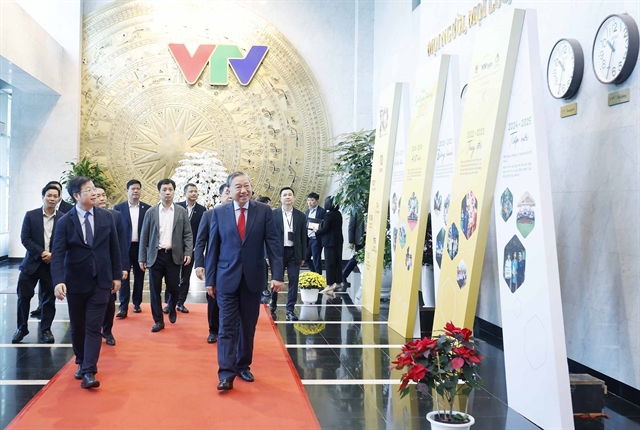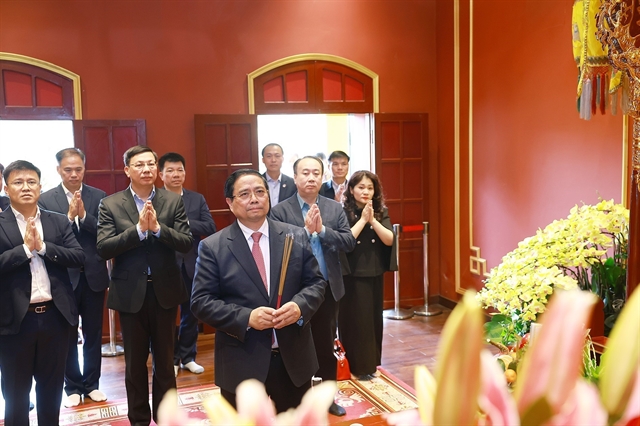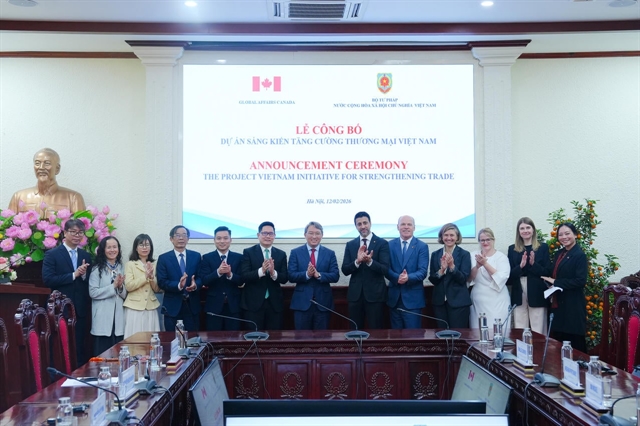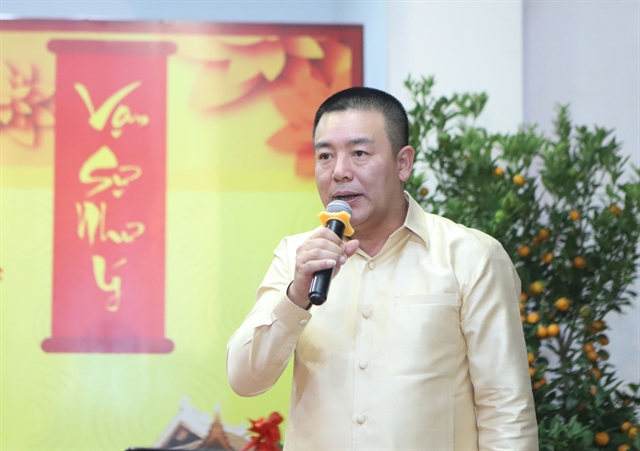 Politics & Law
Politics & Law
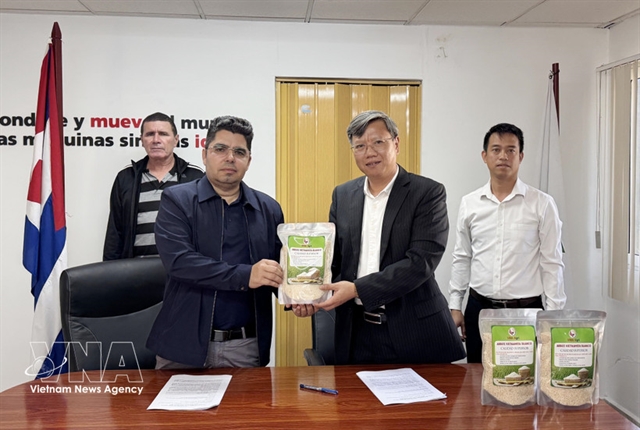
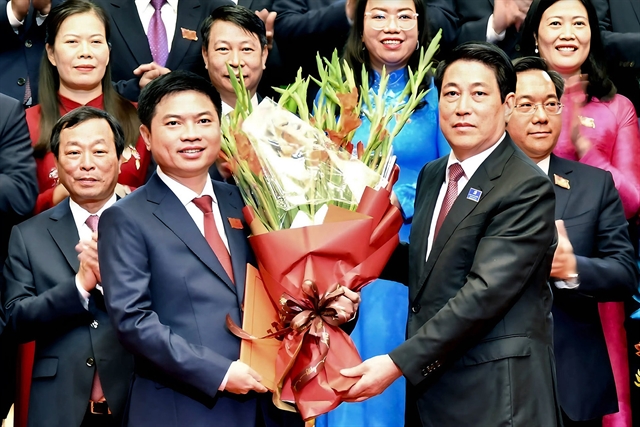 |
| President Lương Cường (right) presents a bouquet to Trương Quốc Huy, who has been appointed the Party Secretary of Phú Thọ Province. Photo tienphong.vn |
Compiled by Lê Việt Dũng
The Communist Party of Việt Nam is reshaping how power works at the local level, and it’s doing so by sending nonnative leaders to take charge.
In a major political reorganisation, the Party is enforcing a new rule: provincial and city leaders, starting with Party secretaries, can no longer come from the places they govern.
The policy, already tested in several provinces and cities, is now being scaled up nationwide. By mid-October, a draft report for the Party’s 14th National Congress stated that Việt Nam had, for the first time, appointed all provincial and city Party secretaries from outside their home provinces and cities.
Roughly half of provincial and city inspection committee heads are now non-locals, with the goal of full rotation by the 2025–2030 term. The same report outlines plans to assign outsiders to key positions such as People’s Committee (Administration) chairpersons and chief inspectors before or soon after the Congress.
The goal, Party leaders say, is to stop corruption and cronyism at its roots, by breaking the dense webs of family, business and political ties that have long skewed local power.
For years, provincial and city governments have been undermined by what Vietnamese officials call sân sau – literally "backyards" – a term describing the informal networks linking local officials with relatives and business allies.
These relationships have fuelled nepotism, favouritism, and, in some cases, collective wrongdoing.
Party General Secretary Tô Lâm told voters in Hà Nội in late September that several major corruption cases shared one thing in common: the top leaders were locals. The new rule, he said, aimed to change that dynamic entirely.
By appointing nonnative leaders, the Party hopes to cut off local patronage networks before they can form.
"Power must be locked through design, operated with discipline and transparency, and directed toward national, not personal, interests," said Nguyễn Sĩ Dũng, former deputy director of the National Assembly Office.
Analysts see the reform as a philosophical shift, from relying on the personal virtue of local leaders to creating systems that make abuse of power structurally harder.
Rotating officials between regions or from the central government to the provinces and cities is meant to prevent what some call "soft fiefdoms" of local power.
"This rebalances the Party’s chain of accountability," said Dũng. "It widens horizons and reduces dependence on old networks."
He argued that when political, administrative and oversight roles are held by people from different regions, it would become harder for any single interest group to dominate.
A policy rooted in history
The idea isn’t new. Historians note that the principle dates back to the 15th century, when King Lê Thánh Tông forbade officials from governing their hometowns, marrying locals or building homes where they served.
The Nguyễn Dynasty continued the practice, assigning northern mandarins to southern provinces and vice versa.
Nguyễn Trọng Phúc, former director of the Party History Institute, said "the modern version of that policy carries the same message: the entire country is our homeland – and we should not divide it into 'your province and mine'".
He argued that localism has long been a drag on effective governance. When leaders become entangled in family or business ties, their ability to act objectively is often the first to suffer.
Beyond its anti-corruption focus, the policy also fits into Việt Nam’s broader push towards a more professional and accountable civil service.
Analysts describe it as a step towards service-oriented governance – a system where local governments compete on performance, not patronage.
"When the triangle of power, kinship and business is separated," said Dũng, "the cost of corruption rises and transparency improves."
Trần Anh Tuấn, chairman of the Việt Nam Association of Administrative Sciences, called it a "declaration of war" on cronyism. He said the move would help attract talent based on competence rather than connections.
"Anyone with ability and commitment deserves to be trusted – regardless of where they’re from," Tuấn said.
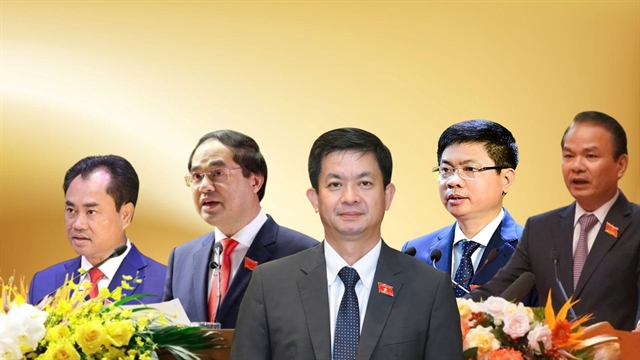 |
| From left to right: the newly appointed Party Secretaries of Lào Cai, Thái Nguyên, Cần Thơ, Phú Thọ, and Ninh Bình all come from outside the provinces they now lead. Photo tienphong.vn |
Can outsiders really govern better?
Still, not everyone sees smooth sailing ahead. Outsiders often face scepticism or even passive resistance from local cadres, and they must quickly learn the cultural, social, and economic nuances of unfamiliar provinces and cities.
Tuấn admitted that new leaders would face a learning curve, but said the difficulty was overstated.
"What matters more than origin is attitude – the willingness to listen, learn, and work with the people.
"The initial lack of local knowledge isn’t fundamental," he said. "It can be overcome through practical engagement and the support of local officials."
Some warn of another risk: that incoming leaders might simply build new patronage networks of their own. Experts say the key is to pair rotation with stronger transparency rules, public asset declarations, and clearer performance metrics.
The Government is also tying the reform to a broader overhaul of how officials are evaluated. Rather than rewarding compliance with procedures, performance will now be measured by results – economic growth, public satisfaction, and institutional integrity.
"Results reflect everything – ideology, ethics, leadership, and management capacity," said Tuấn. "They can be quantified. That’s how you separate those who deliver from those who merely hold office."
Analysts say the new policy could help rebuild public trust by replacing networks of loyalty with systems of accountability.
"The key is not where a leader comes from," said former deputy minister of Home Affairs Nguyễn Tiến Dĩnh. "It’s whether they act for the common good. If they come from outside and then bring their own circle, that’s no better than before."
Analysts describe the shift as part of a wider effort to modernise the state, moving from a control-oriented administration toward a data-driven, performance-based model.
The coming years will show whether Việt Nam’s political system can rise to match the clarity of its new vision. As one analyst put it, the reform would only be a beginning – a "soft shield" for integrity, built not on the hope that leaders remain virtuous but on the design of a system that no longer depends on virtue alone. VNS

